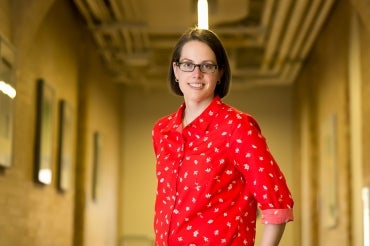Emergency doctor goes from rescue ship to newsroom with U of T's Fellowship in Global Journalism

“When you read about people drowning in the Mediterranean, you normally read about 5,000 people. What’s missing are those individual voices to really make people care," says Sarah Giles (photo by Dhoui Chang)
Published: April 20, 2018
If you ask Sarah Giles what a normal work week looks like for her, she will tell you that for most of her career, there has been no such thing. Before she joined the Munk School’s Fellowship in Global Journalism at the University of Toronto last September, Giles had been working as a family and emergency doctor with various organizations, including Doctors Without Borders/Médecins Sans Frontières (MSF).
For one of her assignments with MSF, Giles spent four months on board MV Aquarius, a rescue ship jointly operated by MSF and SOS Mediterranée – and when you’re stationed aboard a ship in the Mediterranean Sea, pulling refugees out of ramshackle boats to safety, a regular schedule is wishful thinking.
“Some days you’re bobbing around in a flat sea, perfectly blue skies and nothing is happening, and other days there’s waves and storms and you’re doing rescues. There was no ability to predict what was going to happen, which was hard because you had no sense of control.”
Throughout her 15 weeks at sea, Giles and her team rescued more than 4,000 people – some of them in life-threatening conditions.
“I remember rescuing a severely malnourished pregnant woman,” Giles says. “She was in terrible shape when she went into labour and we had to get her off the boat into a hospital. Otherwise, she and the baby wouldn’t have had a chance to survive.”
What struck Giles during her time at sea were the many personal stories people told her and her team – and the increasing realization that these stories needed to be shared with the world.
“When you read about people drowning in the Mediterranean, you normally read about 5,000 people. What’s missing are those individual voices to really make people care – like when the story of Alan Kurdi broke, everyone took a collective gasp,” she says.
“If people understand that these are fellow humans with hopes and dreams just like the rest of us, it’ll help make us all be a bit more kind, I think.”
Giles realized that as a medical professional, she had a vast amount of expertise and stories to share. More importantly, her profession gave her access to places and people reporters often struggle to reach. Giles decided to take advantage of her unique position. She enrolled in the Munk School’s Fellowship in Global Journalism, a program that recruits subject-matter experts from around the world and teaches them how to work as multimedia journalists.
“Media outlets no longer have enough beat reporters to cover complex stories,” says Robert Steiner, director of the Fellowship in Global Journalism and a former foreign correspondent for The Wall Street Journal.
“That’s why we mentor people who have a deep understanding of the subjects they are covering. They are able to approach their own disciplines with a truly open mind and find fantastic stories that conventional reporters miss.”
Although she had to take eight months off work, Giles hasn’t regretted her decision to enrol, she says. The program has not only taught her the basics of journalism but also provided her with a network of dedicated, savvy mentors.
“I’ve been sincerely impressed with the calibre and the generosity of the people who teach us,” Giles says. “We are supervised by journalists with a ton of experience. Despite the fact that we are basically nipping at their heels, they have been open, friendly and encouraging.”
One of the most important skills she’s learned is the art of media pitching. Over the last months, her writing has been published in various publications such as The Walrus, drawing attention to the staggering lack of health services in the Northwest Territories.
Access to health care in Canada’s First Nations communities is an issue Giles is deeply passionate about. In addition to her medical work in remote conflict zones, her portfolio includes working with First Nations communities. Her work up north has brought her face-to-face with the limits of her own country, she says.
“If you look at the social determinants of health, every determinant is worse if you are First Nations or Inuit. Our government needs to invest in health infrastructure – basic things like clean water and power. I recently saw a lady who broke her hip on the way to the outhouse because her house didn’t have plumbing,” Giles says.
“I don’t need to go overseas to work in a humanitarian crisis area. Unfortunately, I can do that in my own country.”
After finishing her fellowship in global journalism later this April, Giles will head to the Northwest Territories to continue providing health care to people in need – and to write about the issues that impact her patients' quality of care and life.
“We all have to do our part to fight for a more equitable world,” Giles says. “I love to work for people in Canada and around the world, who don’t have good access to medical care. It’s so fundamental to their well-being. If I can help them live a better life, that’s just levelling the playing field.”
Topics
Munk School



